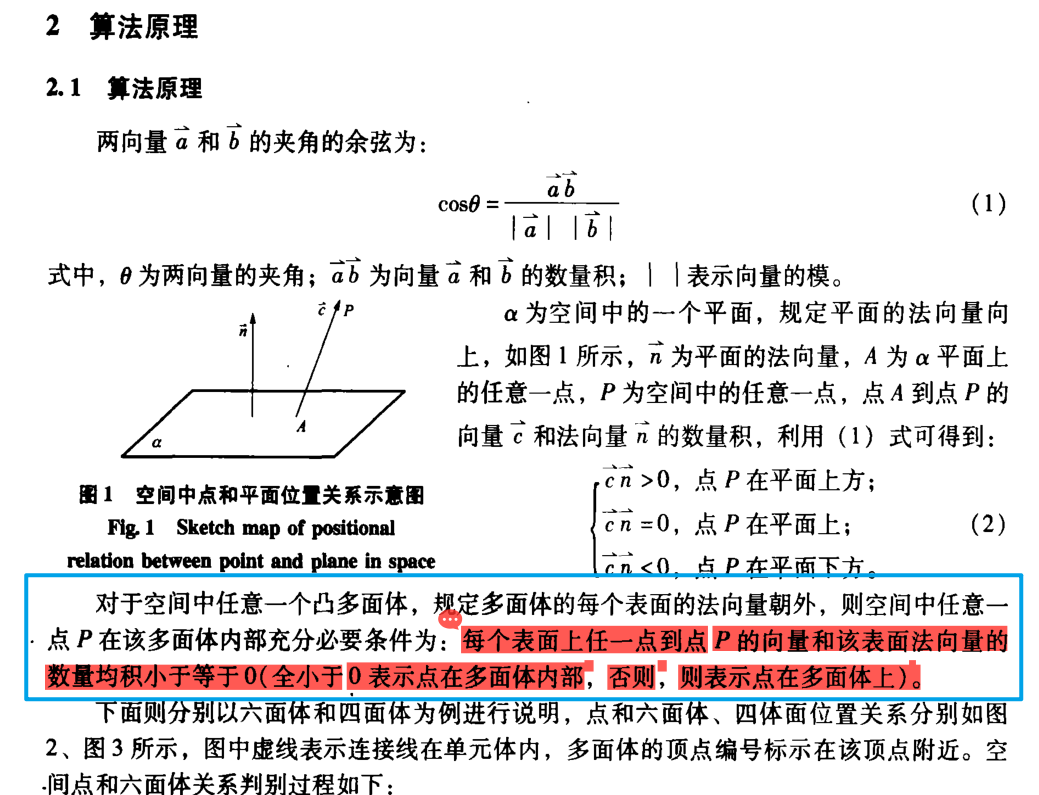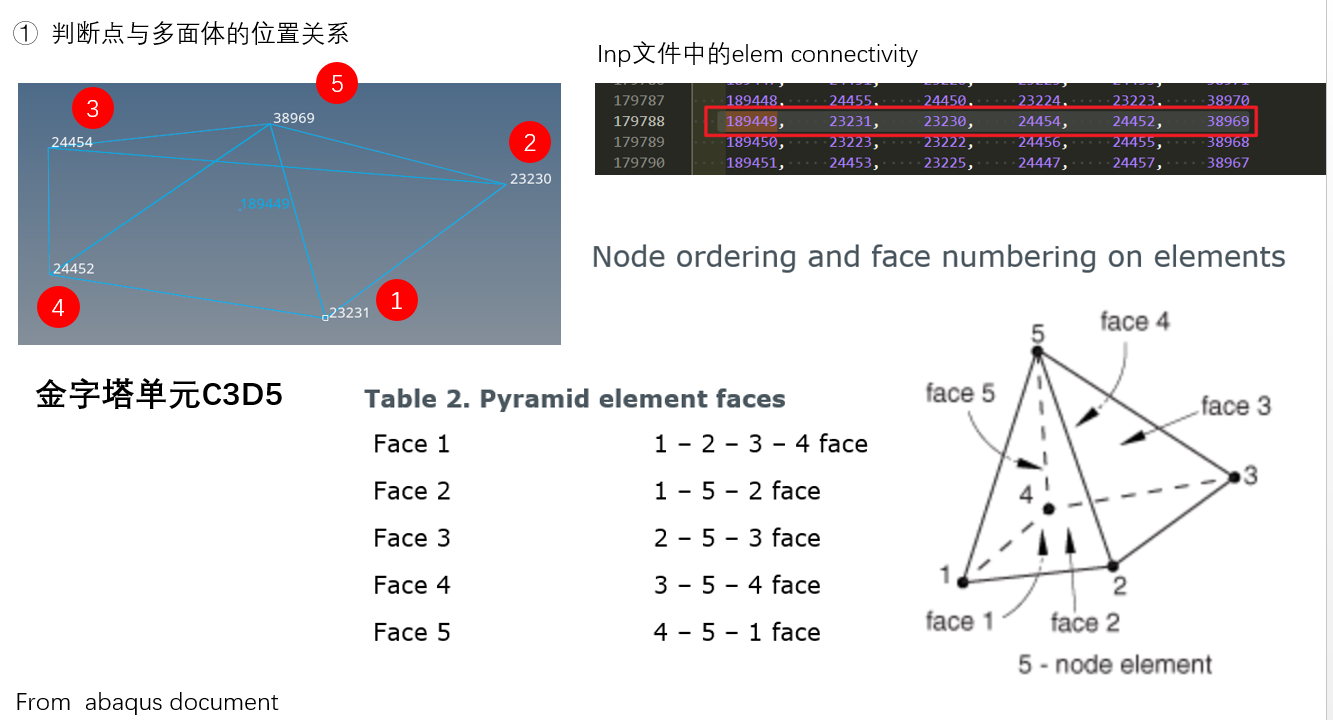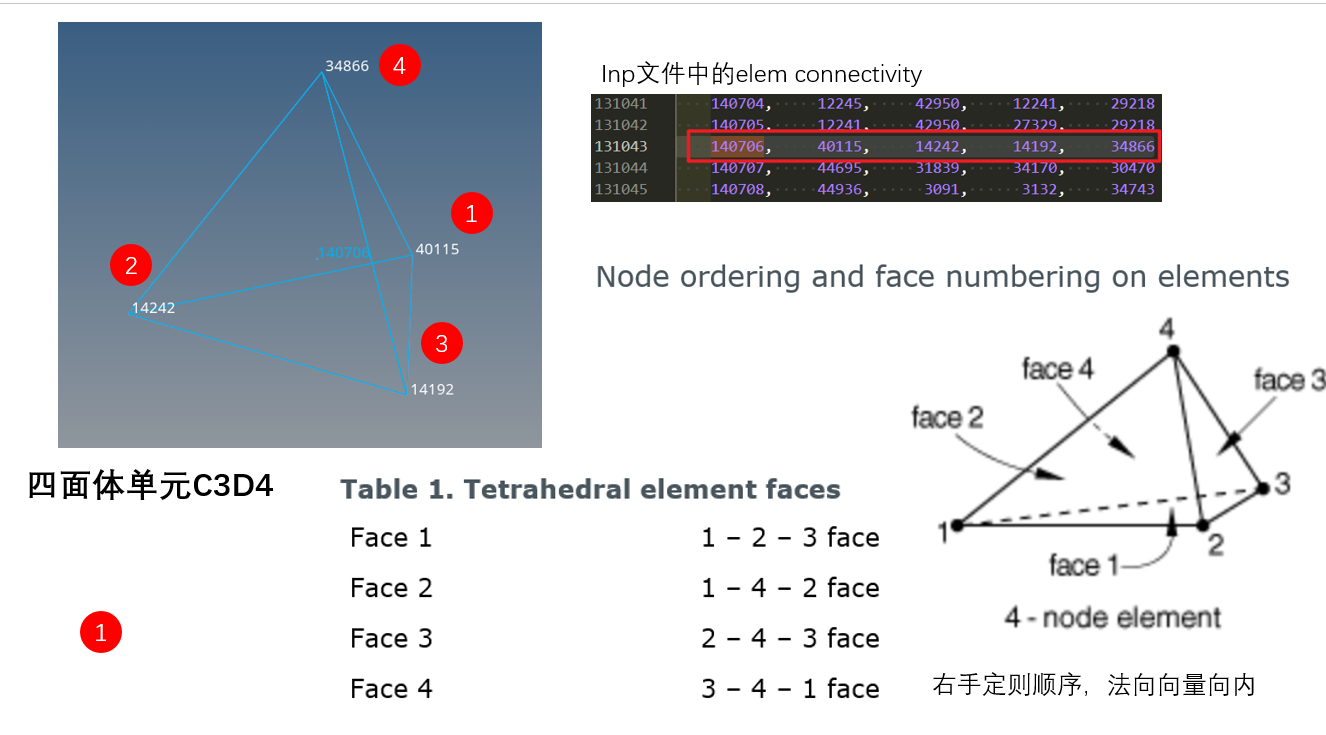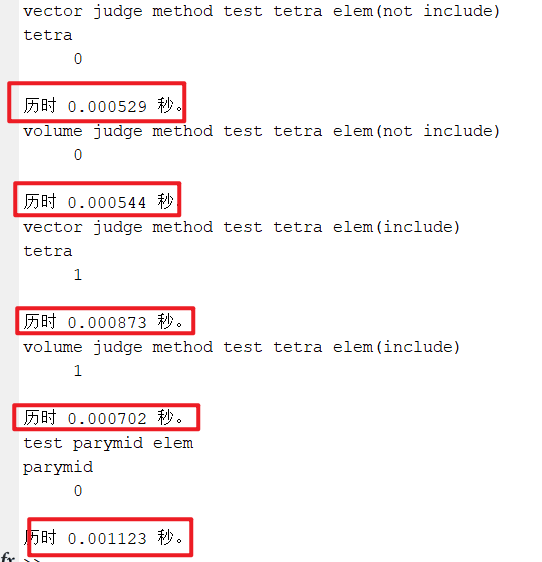【Matlab】判断点和多面体位置关系的两种方法实现
1.【数学公式】mathtype和word2016集成2.【MathType】word2016数学公式编号3.【Matlab】基于KDtree的最近邻搜索和范围搜索
4.【Matlab】判断点和多面体位置关系的两种方法实现
5.《空间三角面片对相交判断算法》的matlab实现_ 0.2微秒6.Mpmath库-学习笔记7.有限元方法[Matlab]-笔记8.结构动力学教材-学习笔记9.复合材料力学基础及有限元分析10.【数值计算方法】数值积分&微分-python实现11.【数值计算方法】2&3维高斯积分的python实现12.【数值计算方法】线性方程组的迭代解法13.【数值计算方法】线性方程组迭代算法的Python实现14.【数值计算方法】线性方程组的迭代解法-数值实验15.【数值计算方法】非线性方程求根16.【数值计算方法】非线性方程求根-数值实验17.【数值计算方法】常微分方程初值问题的数值解18.Note_Fem边界条件的处理和numpy实现的四种方法分别是向量判别法(算法来自他人论文)、体积判别法(code 是我从网上找的)。
方法一: 向量判别法
方法来自一会议论文:《判断点与多面体空间位置关系的一个新算法_石露》2008年,知网、万方、百度学术有收录。
优点:
- 适合任意多面体
- 计算简单
- 速度快
算法原理

Matlab 实现
主函数为InPolyhedronByVJM(Nodes,P),当前仅支持ABAQUS 四面体和五面体单元,其余有需要的可自行在switch语句添加函数。
输入:
- Nodes:包含节点顺序和坐标的N x 3的矩阵
- P:1x3的行向量
这是我根据ABAQUS单元规则编写的函数,因此其他软件的网格信息文件还需要重写。
function flag = InPolyhedronByVJM(Nodes,P) % 根据向量判别法,判断点和多面体的位置关系. % 算法依据:石露,白冰,李小春. 判断点与多面体空问位置关系的一个新算法[C]. % 输入: % + Nodes: n x 3 matrix % + P : 1 x 3 row vector % 单元节点顺序需要满足ABAQUS的约定。 % Nodes是一个n x 3的数值矩阵,每一行表示多面体的一个节点的空间坐标。 % 点在多面体内部的充分必要条件:每个face上任一点到点P的向量和该face法向量的数量积都 % 小于等于0,否则在体外。 NumOfNode = size(Nodes, 1); switch NumOfNode case 4 flag = InTetrahedron(Nodes, P); disp('tetra') case 5 flag = InPyramid(Nodes, P); disp('parymid') end end
针对C3D4类单元的判别函数
function flag = InTetrahedron(Nodes, P) % tetra elem have 4 face. % ABAQUS rule about node ordering and face numbering on element FaceIDX = [1 2 3; 1 4 2; 2 4 3; 3 4 1]; for faceId = 1 : 1 : size(FaceIDX, 1) % judge face i: node 1-node 2-node 3 face % get face normal vector(outside) n = -1 .* GetNormVector(Nodes(FaceIDX(faceId, 1), :), Nodes(FaceIDX(faceId, 2), :), Nodes(FaceIDX(faceId, 3), :)); % calculate dot product of P and normal vector n N1P = P - Nodes(FaceIDX(faceId, 1), :); f = dot(N1P, n); if f > 0 flag = 0; return end end flag=1; end
针对C3D5类单元的判别函数
function flag = InPyramid(Nodes, P) % Pyramid elem have 5 face. % ABAQUS rule about node ordering and face numbering on element FaceIDX = [1 2 3 4; 1 5 2 0; 2 5 3 0; 3 5 4 0; 4 5 1 0]; for faceId = 1 : 1 : size(FaceIDX, 1) % judge face i: node 1-node 2-node 3 face % get face normal vector(outside) n = -1 .* GetNormVector(Nodes(FaceIDX(faceId, 1), :), Nodes(FaceIDX(faceId, 2), :), Nodes(FaceIDX(faceId, 3), :)); % calculate dot product of P and normal vector n N1P = P - Nodes(FaceIDX(faceId, 1), :); f = dot(N1P, n); if f > 0 flag = 0; return end end flag = 1; end
求面法向向量的函数
function NormalVector = GetNormVector(p1, p2, p3) % function return a Normal Vector,base on RightHand Rule, according to three point (row vector) % NormalVector=cross product of (p2-p1) and (p3-p1) % check if (~isrow(p1)) || (~isrow(p2)) || (~isrow(p3)) return end p1p2 = p2 - p1; p1p3 = p3 - p1; NormalVector = cross(p1p2, p1p3); end
附:abqus四面体和五面体单元的节点约定


测试Matlab的速度和准确度
%% vector judge method test tetra elem (not include) Nodes = [40033.883285119, 264.5168630711 , 460.70942035982; 40038.586165682, 269.82366853938, 464.20374836087; 40032.364670267, 268.77493858153, 464.18513138978; 40035.61509136 , 262.38393588741, 466.45744915188]; P = sum(Nodes)/4+[100 0 0]; tic disp('vector judge method test tetra elem(not include)') flag = InPolyhedronByVJM(Nodes, P); disp(flag) toc clear %% volume judge method test tetra elem (not include) Nodes = [40033.883285119, 264.5168630711 , 460.70942035982; 40038.586165682, 269.82366853938, 464.20374836087; 40032.364670267, 268.77493858153, 464.18513138978; 40035.61509136 , 262.38393588741, 466.45744915188]; P = sum(Nodes)/4+[100 0 0]; tic disp('volume judge method test tetra elem(not include)') flag = inpolyhedronByVolCal(Nodes, P); disp(flag) toc clear %% vector judge method test tetra elem (include) Nodes = [40033.883285119, 264.5168630711 , 460.70942035982; 40038.586165682, 269.82366853938, 464.20374836087; 40032.364670267, 268.77493858153, 464.18513138978; 40035.61509136 , 262.38393588741, 466.45744915188]; P = sum(Nodes)/4; tic disp('vector judge method test tetra elem(include)') flag = InPolyhedronByVJM(Nodes, P); disp(flag) toc clear %% volume judge method test tetra elem (include) Nodes = [40033.883285119, 264.5168630711 , 460.70942035982; 40038.586165682, 269.82366853938, 464.20374836087; 40032.364670267, 268.77493858153, 464.18513138978; 40035.61509136 , 262.38393588741, 466.45744915188]; P = sum(Nodes)/4; tic disp('volume judge method test tetra elem(include)') flag = inpolyhedronByVolCal(Nodes, P); disp(flag) toc clear %% vector judge method test parymid elem % node connectivity satisfy abaqus rule Nodes = [40074.01489458, 184.27859731629, 355.37056669335; 40081.032227826, 179.72253222636, 357.32796879472; 40080.400160415, 184.49866619658, 366.02835222196; 40073.363546048, 189.104242665, 363.93134923301; 40077.379811862, 179.07892353029, 363.81547779482; ]; P = [40077.2381281462+100 183.336592386904 361.294742947572]; tic disp('test parymid elem') flag = InPolyhedronByVJM(Nodes, P); disp(flag) toc clear

方法二:体积判别法
这个代码是我在网上找的,出处已经忘了。
Matlab实现(仅限四面体)
function inflag = inpolyhedronByVolCal(points_mat, p_detected) % input: % + points_set : 4 point's x y z coordinate,integrated in a 4X3 matrix % + p_detected : a point needed to detect ,1X3 matrix contain x y z % coordinate % return : inflag: 0 or 1 D0 = det([points_mat(1, :) 1; points_mat(2, :) 1; points_mat(3, :) 1; points_mat(4, :) 1]); D1 = det([p_detected 1; points_mat(2, :) 1; points_mat(3, :) 1; points_mat(4, :) 1]); D2 = det([points_mat(1, :) 1; p_detected 1; points_mat(3, :) 1; points_mat(4, :) 1]); D3 = det([points_mat(1, :) 1; points_mat(2, :) 1; p_detected 1; points_mat(4, :) 1]); D4 = det([points_mat(1, :) 1; points_mat(2, :) 1; points_mat(3, :) 1; p_detected 1]); if (D0 < 0 && D1 < 0 && D2 < 0 && D3 < 0 && D4 < 0) || ((D0 > 0 && D1 > 0 && D2 > 0 && D3 > 0 && D4 > 0)) inflag = 1; else inflag = 0; end end
本文来自博客园,作者:FE-有限元鹰,转载请注明原文链接:https://www.cnblogs.com/aksoam/p/17590039.html



【推荐】国内首个AI IDE,深度理解中文开发场景,立即下载体验Trae
【推荐】编程新体验,更懂你的AI,立即体验豆包MarsCode编程助手
【推荐】抖音旗下AI助手豆包,你的智能百科全书,全免费不限次数
【推荐】轻量又高性能的 SSH 工具 IShell:AI 加持,快人一步
· 25岁的心里话
· 闲置电脑爆改个人服务器(超详细) #公网映射 #Vmware虚拟网络编辑器
· 零经验选手,Compose 一天开发一款小游戏!
· 通过 API 将Deepseek响应流式内容输出到前端
· AI Agent开发,如何调用三方的API Function,是通过提示词来发起调用的吗